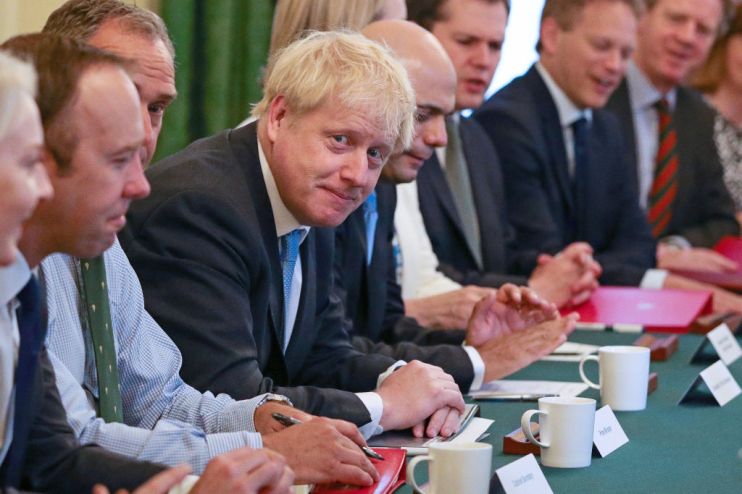Boris Johnson gears up for war with a cabinet of resurrected soldiers

They say you can’t make an omelette without breaking some eggs.
Apparently, you also can’t build a governmental team capable of taking Britain out of the EU without breaking apart any sense of unity or collaborative sentiment in the Conservative party.
Boris Johnson has appointed a cabinet of the living dead, not in the way of Theresa May’s lurching zombie government, but in that it resurrects a host of figures from the murky past who you thought had been axed for good.
Priti Patel is home secretary, despite being sacked by May for conducting secret meetings with Israeli officials while on holiday.
Gavin Williamson, who just months ago looked at risk of prosecution for allegedly leaking information from a classified national security meeting, has been reincarnated as education secretary.
Dominic Raab and Andrea Leadsom, who both resigned at different points over a Brexit deal that they had either helped negotiate or signed off on, now have top jobs.
Never mind the new foreign secretary’s self-professed dubious grasp of European geography, or the business secretary’s reputation as one of the most inept Treasury ministers ever. They’re in.
And then there’s the new transport secretary, who has made the most astounding comeback of all.
Grant Shapps resigned as David Cameron’s international development minister in November 2015, following revelations of a party-wide bullying scandal and the suicide of a young Tory activist.
While Shapps denied allegations that he had ignored the reports of bullying, the whole tragic affair was generally considered – whether fairly or not – to have put a stake through the heart of his political career.
Not so. Shapps is back from the parliamentary dead.
Why? Boris was not short on choice for his new cabinet. In fact, many of the 17 ministers culled this week were expecting to keep their jobs. It isn’t hard to imagine an alternate universe cabinet that keeps the disgraced mavericks far from the front benches, instead inviting a broad coalition of moderates to join the obvious Brexiteer choices.
The answer is simple: Boris is preparing for war, and this cabinet is his army.
The return of Patel, Raab and Leadsom is obvious. For all their sins, they were part of the core Vote Leave team during the referendum.
With Michael Gove promoted to the vaguely titled office of chancellor of the Duchy of Lancaster (colloquially known as “secretary of state for getting things done”), and Stephen Barclay keeping his job as Brexit secretary, this is essentially the Vote Leave government, reuniting after three years in the wilderness for an epic comeback tour.
And, of course, it will all be stage-managed by Vote Leave architect Dominic Cummings, who is on board as de facto chief of staff. Widely regarded as instrumental in winning the referendum, Cummings is now back to orchestrate a Brexit-based election along the exact same lines.
The plan, evidently, is to win the anti-EU voters who have drifted towards Nigel Farage’s Brexit Party – and who better to lead the charge than the team who won the referendum in the first place?
A calculation has been made that moderates aren’t worth fighting for – as they will either reluctantly vote Tory in fear of Jeremy Corbyn, or support the Liberal Democrats and split the opposition vote. Disenchanted Brexit voters are the prize.
What of Williamson and Shapps, who were both Remainers back in 2016? Why reignite the controversies that led to their removals by promoting them?
One word: numbers. Say what you like about Williamson (and everyone does), he was a ruthless chief whip who knows exactly where the bodies are buried. And he put those whipping skills to good use when it came to the first rounds of the leadership contest.
Shapps, meanwhile, was the “spreadsheet guy” for Boris, keeping meticulous track of how MPs planned to vote, and expertly “lending” votes to other candidates in order to manipulate who made it into the final two.
That both are now back in favour is, firstly, a message about loyalty – the carrot to offset a stick that was so abundantly evident when Jeremy Hunt was offered a demotion and his ally Penny Mordaunt was unceremoniously pushed out.
But more than that, this is a sign that Boris is ready to fight, and for that he needs hardcore strategists, both to push through legislation in the Commons, and to crunch the numbers when he inevitably goes to the nation for a fresh mandate.
In the words of George Washington in the hit musical Hamilton, “winning was easy, young man, governing’s harder”. Despite rows over spilt wine and a few rocky interviews, securing the Tory leadership was a breeze for Boris. Governing with a majority of just three, when he has just antagonised 17 members of his own party, won’t be.
So rather than attempting to build consensus, the new Prime Minister is gearing up for another battle, having breathed fresh life into a team of footsoldiers who are now gratefully ready to take a political bullet for him if necessary.
That proverb about omelettes and eggs is usually credited to Aimable Pelissier, Napoleon III’s leading general in the Crimean War, noted for its “long-drawn-out… notoriously incompetent butchery”.
Whisking up the cabinet is just the start for Boris. Next stop: the country.
Main image credit: Getty